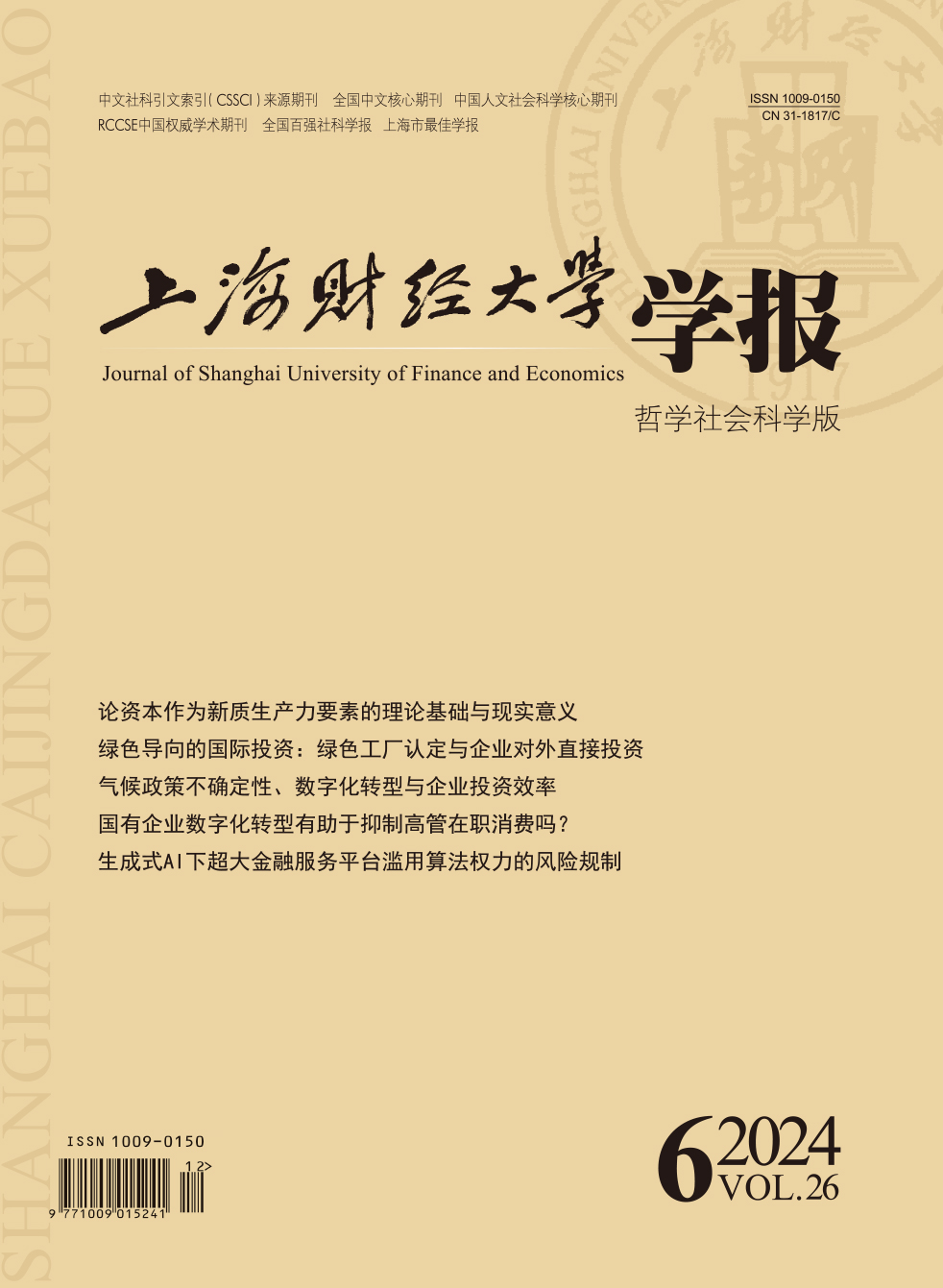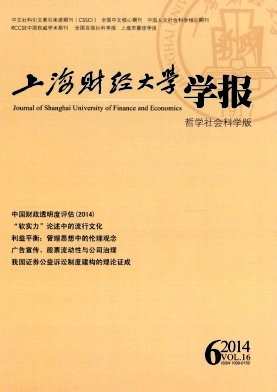外部压力能促进企业履行环境责任吗?——基于中国转型经济背景的实证研究
上海财经大学学报 2014 年 第 16 卷第 06 期, 页码:40 - 49
摘要
参考文献
摘要
近年来,环境问题受到管理者和研究者的普遍关注,引导和管制企业履行环境责任已成为一个亟待解决的重大议题。文章基于利益相关者理论和制度理论,研究发现利益相关者压力和制度压力对企业环境责任具有显著的正向影响,伦理领导对利益相关者压力、制度压力与企业环境责任的关系具有中介作用,利他性价值观和绿色创新正向调节了伦理领导与企业环境责任的关系。研究结论有利于促进管理者对企业环境责任与企业财务绩效的融合,提升企业声誉和竞争力,可为政府制定政策和对企业进行环境责任监管提供帮助。
[1]李彬,谷慧敏,高伟.制度压力如何影响企业社会责任:基于旅游企业的实证研究[J].南开管理评论,2011,(6).
[2]刘敏.外部压力、公司绩效与社会责任信息披露[D].辽宁大学,2012.
[3]稻田健志.企业环境报告书导则与其推广——基于中日制度的比较研究[J].商业时代,2011,(9).
[4]莫申江,王重鸣.国外伦理型领导研究前沿探析[J].外国经济与管理,2010,(2).
[5]冯臻.从众还是合规:制度压力下的企业社会责任抉择[J].财经科学,2014,(4).
[6]梁强,林丹明,马靖楠.制度压力、高管团队支持和ERP应用[J].汕头大学学报,2013,(8).
[7]Amit R.,Schoemaker P.J.R.Strategic Assets and Organizational Rent[J].Strategic Management Journal,1993,14(1):33-46.
[8]Baron R.M.,Kenny D.A.The Moderator-mediator Variable Distinction in Social Psychological Research:Conceptual,Strategic,and Statistical Considerations[J].Journal of Personality and Social Psychology,1986,51(6):1173-1182.
[9]Brown M.E.,Trevino L.K.Ethical Leadership:A Social Learning Theory Perspective for Construct Development[J].Organizational Behavior and Human Decision Processes,2005,97(2):117-134.
[10]Campbell J.L.Why would Corporations Behave in Socially Responsible Ways?An Institutional Theory of Corporate Social Responsibility[J].Academy of Management Review,2007,32(3):946-967.
[11]Chang C.The Influence of Corporate Environmental Ethics on Competitive Advantage:The Mediation Role of Green Innovation[J].Journal of Business Ethics,2011,104(3):361-370.
[12]Chen Y.S.,Lai S.B.,Wen C.T.The Influence of Green Innovation Performance on Corporate Advantage in Taiwan[J].Journal of Business Ethics,2006,81(3):531-543.
[13]DiMaggio P.J.,Powell W.W.The Iron Cage Revisited:Institutional Isomorphism and Collective Rationality in Organizational Fields[J].American Sociological Review,1983,48(2):147-160.
[14]Du S.,Bhattacharya C.B.,Sen S.Maximizing Business Returns to Corporate Social Responsibility(CSR):The Role of CSR Communication[J].International Journal of Management Reviews,2010,12(1):8-19.
[15]Edwards J.R.,Lambert L.S.Methods for Integrating Moderation and Mediation:A General Analytical Framework using Moderated Path Analysis[J].Psychological Methods,2007,12(1):1-22.
[16]Egri C.P.,Yu J.S.The Influence of Stakeholder Pressures on Corporate Social Responsibility in East Asia[C].IACMR Conference,2012.
[17]Joseph E.Corporate Social Responsibility:Delivering the New Agenda[J].New Economy,2001,8(2):121-123.
[18]Laine M.Ensuring Legitimacy through Rhetorical Changes?A Longitudinal Interpretation of the Environmental Disclosures of a Leading Finnish Chemical Company[J].Accounting,Auditing&Accountability Journal,2009,22(7):1029-1054.
[19]Lee M.P.Configuration of External Influences:The Combined Effects of Institutions and Stakeholders on Corporate Social Responsibility Strategies[J].Journal of Business Ethics,2011,102(2):281-298.
[19]Marín L.,RubioA.,Maya S.R.Competitiveness as a Strategic Outcome of Corporate Social Responsibility[J].Corporate Social Responsibility and Environmental Management,2012,19(6):364-376.
[20]Nir K.Institutional Factors Affecting Offshore Business Process and Information Technology Outsourcing[J].Journal of International Management,2007,13(1):38-56.
[21]Porter M.E.,Van Der Linde C.Green and Competitive:Ending the Stalemate[J].Harvard Business Review,1995,73(5):120-134.
[22]Schwartz S.H.,Boehnke K.Evaluating the Structure of Human Values with Confirmatory Factor Analysis[J].Journal of Research in Personality,2004,38(3):230-255.
[23]Tian Q.,Liu Y.The Interactive Effect of Stakeholder Pressure and Ethical Leadership on Corporate Social Responsibility[C].IACMR Conference,2012.
[24]Trevino L.K.,Hartman L.P.,Brown M.Moral Person and Moral Manager:How Executives Develop a Reputation for Ethical Leadership[J].California Management Review,2000,42(4):128-142.
[25]Utterback J.M.,Abernathy W.J.A Dynamic Model of Process and Product Innovation[J].Omega,1975,3(6):639-656.
[26]Wahba H.Does the Market Value Corporate Environmental Responsibility?An Empirical Examination[J].Corporate Social Responsibility and Environmental Management,2008,15(2):89-99.
[27]Wu L.,Kwan H.K.,Yim F.H.,et al.CEO Ethical Leadership and Corporate Social Responsibility:A Moderated Mediation Model[J].Journal of Business Ethics,2014,2.
[2]刘敏.外部压力、公司绩效与社会责任信息披露[D].辽宁大学,2012.
[3]稻田健志.企业环境报告书导则与其推广——基于中日制度的比较研究[J].商业时代,2011,(9).
[4]莫申江,王重鸣.国外伦理型领导研究前沿探析[J].外国经济与管理,2010,(2).
[5]冯臻.从众还是合规:制度压力下的企业社会责任抉择[J].财经科学,2014,(4).
[6]梁强,林丹明,马靖楠.制度压力、高管团队支持和ERP应用[J].汕头大学学报,2013,(8).
[7]Amit R.,Schoemaker P.J.R.Strategic Assets and Organizational Rent[J].Strategic Management Journal,1993,14(1):33-46.
[8]Baron R.M.,Kenny D.A.The Moderator-mediator Variable Distinction in Social Psychological Research:Conceptual,Strategic,and Statistical Considerations[J].Journal of Personality and Social Psychology,1986,51(6):1173-1182.
[9]Brown M.E.,Trevino L.K.Ethical Leadership:A Social Learning Theory Perspective for Construct Development[J].Organizational Behavior and Human Decision Processes,2005,97(2):117-134.
[10]Campbell J.L.Why would Corporations Behave in Socially Responsible Ways?An Institutional Theory of Corporate Social Responsibility[J].Academy of Management Review,2007,32(3):946-967.
[11]Chang C.The Influence of Corporate Environmental Ethics on Competitive Advantage:The Mediation Role of Green Innovation[J].Journal of Business Ethics,2011,104(3):361-370.
[12]Chen Y.S.,Lai S.B.,Wen C.T.The Influence of Green Innovation Performance on Corporate Advantage in Taiwan[J].Journal of Business Ethics,2006,81(3):531-543.
[13]DiMaggio P.J.,Powell W.W.The Iron Cage Revisited:Institutional Isomorphism and Collective Rationality in Organizational Fields[J].American Sociological Review,1983,48(2):147-160.
[14]Du S.,Bhattacharya C.B.,Sen S.Maximizing Business Returns to Corporate Social Responsibility(CSR):The Role of CSR Communication[J].International Journal of Management Reviews,2010,12(1):8-19.
[15]Edwards J.R.,Lambert L.S.Methods for Integrating Moderation and Mediation:A General Analytical Framework using Moderated Path Analysis[J].Psychological Methods,2007,12(1):1-22.
[16]Egri C.P.,Yu J.S.The Influence of Stakeholder Pressures on Corporate Social Responsibility in East Asia[C].IACMR Conference,2012.
[17]Joseph E.Corporate Social Responsibility:Delivering the New Agenda[J].New Economy,2001,8(2):121-123.
[18]Laine M.Ensuring Legitimacy through Rhetorical Changes?A Longitudinal Interpretation of the Environmental Disclosures of a Leading Finnish Chemical Company[J].Accounting,Auditing&Accountability Journal,2009,22(7):1029-1054.
[19]Lee M.P.Configuration of External Influences:The Combined Effects of Institutions and Stakeholders on Corporate Social Responsibility Strategies[J].Journal of Business Ethics,2011,102(2):281-298.
[19]Marín L.,RubioA.,Maya S.R.Competitiveness as a Strategic Outcome of Corporate Social Responsibility[J].Corporate Social Responsibility and Environmental Management,2012,19(6):364-376.
[20]Nir K.Institutional Factors Affecting Offshore Business Process and Information Technology Outsourcing[J].Journal of International Management,2007,13(1):38-56.
[21]Porter M.E.,Van Der Linde C.Green and Competitive:Ending the Stalemate[J].Harvard Business Review,1995,73(5):120-134.
[22]Schwartz S.H.,Boehnke K.Evaluating the Structure of Human Values with Confirmatory Factor Analysis[J].Journal of Research in Personality,2004,38(3):230-255.
[23]Tian Q.,Liu Y.The Interactive Effect of Stakeholder Pressure and Ethical Leadership on Corporate Social Responsibility[C].IACMR Conference,2012.
[24]Trevino L.K.,Hartman L.P.,Brown M.Moral Person and Moral Manager:How Executives Develop a Reputation for Ethical Leadership[J].California Management Review,2000,42(4):128-142.
[25]Utterback J.M.,Abernathy W.J.A Dynamic Model of Process and Product Innovation[J].Omega,1975,3(6):639-656.
[26]Wahba H.Does the Market Value Corporate Environmental Responsibility?An Empirical Examination[J].Corporate Social Responsibility and Environmental Management,2008,15(2):89-99.
[27]Wu L.,Kwan H.K.,Yim F.H.,et al.CEO Ethical Leadership and Corporate Social Responsibility:A Moderated Mediation Model[J].Journal of Business Ethics,2014,2.
引用本文
姜雨峰, 田虹. 外部压力能促进企业履行环境责任吗?——基于中国转型经济背景的实证研究[J]. 上海财经大学学报, 2014, 16(6): 40–49.
导出参考文献,格式为:
下一篇:广告宣传、股票流动性与公司治理





 6322
6322  364
364

